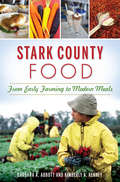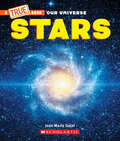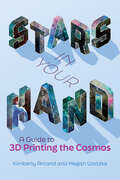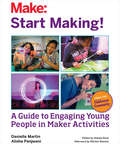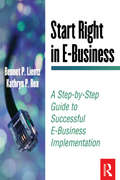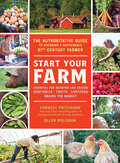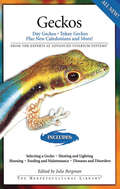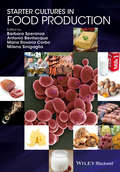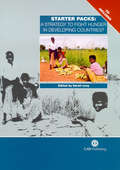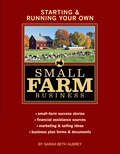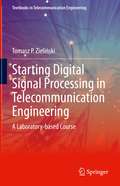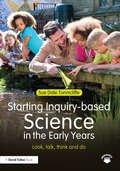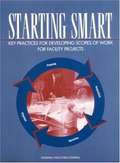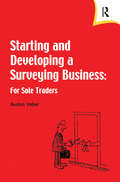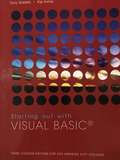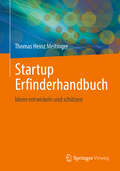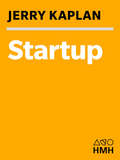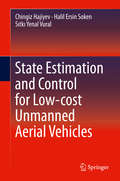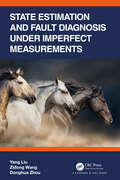- Table View
- List View
Stark County Food: From Early Farming to Modern Meals (American Palate)
by Kimberly A. Kenney Barbara A. AbbottWhether it's homemade chicken pot pie, a steak from Baker's Café or a frozen custard at Meyer's Lake, the food of Stark County has made mouths water for generations. The region's unique soil nurtured an early boom in agriculture, and growers like K.W. Zellers & Son Farms still make a living off the land today. Forgotten mom-and-pop grocery stores such as Flory's and Lemmon's served the needs of their neighborhoods, while long-gone restaurants like Mergus and Topp's Chalet created delicious dishes and cherished memories. Others, like Bender's Tavern and Taggart's Ice Cream Parlor, serve the same legendary fare they have for decades. Families such as the Millers and Swaldos have created nationally recognized destinations out of small and simple starts. Join authors Kim Kenney and Barb Abbott as they trace Stark County's food history from the earliest orchards and farms to today's culinary tourism scene.
Starlight Detectives
by Alan HirshfeldDiscover magazine "Top 5 Summer Read"Scientific American "Recommended" feature review"A masterful balance of science, history and rich narrative." -Discover magazine"Starlight Detectives is just the sort of richly veined book I love to read-full of scientific history and discoveries, peopled by real heroes and rogues, and told with absolute authority. Alan Hirshfeld's wide, deep knowledge of astronomy arises not only from the most careful scholarship, but also from the years he's spent at the telescope, posing his own questions to the stars." -DAVA SOBEL, author of A More Perfect Heaven: How Copernicus Revolutionized the Cosmos and LongitudeIn 1929, Edwin Hubble announced the greatest discovery in the history of astronomy since Galileo first turned a telescope to the heavens. The galaxies, previously believed to float serenely in the void, are in fact hurtling apart at an incredible speed: the universe is expanding. This stunning discovery was the culmination of a decades-long arc of scientific and technical advancement. In its shadow lies an untold, yet equally fascinating, backstory whose cast of characters illuminates the gritty, hard-won nature of scientific progress.The path to a broader mode of cosmic observation was blazed by a cadre of nineteenth-century amateur astronomers and inventors, galvanized by the advent of photography, spectral analysis, and innovative technology to create the entirely new field of astrophysics. From William Bond, who turned his home into a functional observatory, to John and Henry Draper, a father and son team who were trailblazers of astrophotography and spectroscopy, to geniuses of invention such as Léon Foucault, and George Hale, who founded the Mount Wilson Observatory, Hirshfeld reveals the incredible stories-and the ambitious dreamers-behind the birth of modern astronomy.Alan Hirshfeld, Professor of Physics at the University of Massachusetts Dartmouth and an Associate of the Harvard College Observatory, is the author of Parallax: The Race to Measure the Cosmos, The Electric Life of Michael Faraday, and Eureka Man: The Life and Legacy of Archimedes.
Stars (A True Book (Relaunch) #0)
by Joan Marie GalatDid you know that stars explode? Or that they can be different colors? Have you ever wondered how many stars exist in the universe or how they form? These are just a few of the topics covered through the pages of this book.From supergiants to white dwarfs, and star clusters to supernovae, readers will be consumed with fascinating facts and information about these bright, beaming objects in our universe.Planets and stars, moons and galaxies! The universe is a vast and mysterious place with much to explore. And there's no better way to make amazing discoveries about space than with this reimagined series. With the latest NASA imagery, the classic structure and features of A True Book, and lively text, the titles in Our Universe bring the awe of the cosmos directly to readers. Students will come away with a wealth of knowledge about the incredible celestial bodies in our universe.This series covers Next Generation Science Standards core ideas including "The Universe and its stars" and "Earth and the solar system."
Stars in Your Hand: A Guide to 3D Printing the Cosmos
by Megan Watzke Kimberly ArcandAn illustrated guide to exploring the Universe in three dimensions.Astronomers have made remarkable discoveries about our Universe, despite their reliance on the flat projection, or 2D view, the sky has offered them. But now, drawing on the vast stores of data available from telescopes and observatories on the ground and in space, astronomers are using 3D technology to go beyond a flattened view of the cosmos. In Stars in Your Hand, Kimberly Arcand and Megan Watzke offer an illustrated guide to exploring the Universe in three dimensions, with easy-to-follow instructions for creating models of stars and constellations using a 3D printer and 3D computer imaging. Stars in Your Hand and 3D technology make learning about space an adventure. Intrigued by the stunning images from high-powered telescopes? Using this book, you can fly virtually through a 3D spacescape and hold models of cosmic objects in your hand. Arcand and Watzke outline advances in 3D technology, describe some amazing recent discoveries in astronomy, reacquaint us with the night sky, and provide brief biographies of the telescopes, probes, and rovers that are bringing us so much data. They then offer images and instructions for printing and visualizing stars, nebulae, supernovae, galaxies, and even black holes in 3D. The 3D Universe is a marvel, and Stars in Your Hand serves as a unique and thrilling portal to discovery.
Stars, Planets, and Their Patterns (Patterns in the Sky)
by Thomas K. AdamsonWhat are stars? What are planets? Why are some brighter than others? And which planets can we see from Earth? Learn the answers to these questions and more in this easy-to-read title and discover the science behind stars, planets, and their patterns.
Stars, Planets, and Their Patterns (Patterns in the Sky)
by Thomas K. AdamsonWhat are stars? What are planets? Why are some brighter than others? And which planets can we see from Earth? Learn the answers to these questions and more in this easy-to-read title and discover the science behind stars, planets, and their patterns.
Start Making!: A Guide to Engaging Young People in Maker Activities
by Danielle Martin Alisha Panjwani Natalie RuskStart Making! is a program developed by the Clubhouse Network to engage young people all over the world in Maker-inspired activities. With this guide, you will discover how to plan and coordinate Start Making! projects in your home, school, library, community center, after-school club, or makerspace. You'll learn strategies for engaging young people in creative thinking, developing individual and team projects, and sharing and reflecting on their creations.Each session includes a list of the supplies you'll need, step-by-step instructions for completing the projects, and prompts for stimulating discussion, curiosity, and confidence. These fun do-it-yourself (and do-it-together) projects teach fundamental STEAM concepts -- science, technology, engineering, art, and math -- while introducing young people to the basics of circuitry, design, coding, crafting, and construction. They'll make paper cards and creations that light up, play music using a MaKey MaKey keyboard and Scratch programming, join together to make paintings with light, design and construct 3D sculptures, build a vibrating art-bot that makes drawings, and sew fabric creations with wearable circuits.Dip into the activities once a week, run them as a week-long summer activity, or go through the guide in any way that works for you. By offering your own Start Making! program, you can inspire young people in your community to develop creative ideas, learn new skills, and share their creations.The Clubhouse Network is a global network of community-based centers led by Boston's Museum of Science in collaboration with the MIT Media Lab.
Start Right in E-Business
by Bennet Lientz Kathryn ReaE-business occurs when a company has established critical business procedures and activities to support e-commerce transactions. Using this definition, e-commerce is part of e-business--a company needs e-commerce to implement e-business. Utilizing e-commerce, however, does not mean that a company has transformed into an e-business. E-business is implemented only when a company changes its internal procedures to take advantage of the e-commerce technologies.Interest in the evolution ("e-volution") of e-commerce into e-business is a growth field. With the early November announcement that GM and Ford were forming online marketplaces for their suppliers, they placed themselves at the center of new e-business ecosystems that will transform their entire way of doing business. Many firms are increasingly discovering opportunities to move away from simply selling products on the Internet to being able to reinvent their conventional supply chains (as in the auto makers' case) and to being able to offer custom-built products (as Dell Computers does now).
Start Your Engines: Famous Firsts in the History of NASCAR
by Jay W. PennellStart Your Engines contains twenty-nine chapters describing different inaugural accomplishments that have taken place throughout NASCAR history. This book answers the following questions: When was NASCAR officially founded? Where was the first Strictly Stock race held? What was the first flag-to-flag race ever broadcast on TV? When was the first night race? When and where was the first international NASCAR race held? Who was the first woman to win the Daytona 500 pole position? And many more!In Start Your Engines, seasoned writer Jay W. Pennell outlines some of the most iconic and unknown firsts in NASCAR history. From Red Byron to Richard Petty, Dale Earnhardt to Jeff Gordon, Jimmie Johnson to Danica Patrick, Pennell also covers some of the biggest names of the sport and their landmark contributions. Providing in-depth explanations of each milestone, Pennell takes readers through the peaks and valleys of NASCAR history and details the impact each first had on the legacy of the sport. From the earliest days of NASCAR’s foundation, to the high banks of Daytona and famed Brickyard at Indianapolis, Pennell also looks at monumental dates and races that changed the sport and helped it grow from a small gathering of race car drivers and promoters into the multibillion-dollar sports industry it is today. This book is a unique look at racing for new and experienced NASCAR fans alike.Skyhorse Publishing, as well as our Sports Publishing imprint, is proud to publish a broad range of books for readers interested in sports-books about baseball, pro football, college football, pro and college basketball, hockey, or soccer, we have a book about your sport or your team.In addition to books on popular team sports, we also publish books for a wide variety of athletes and sports enthusiasts, including books on running, cycling, horseback riding, swimming, tennis, martial arts, golf, camping, hiking, aviation, boating, and so much more. While not every title we publish becomes a New York Times bestseller or a national bestseller, we are committed to publishing books on subjects that are sometimes overlooked by other publishers and to authors whose work might not otherwise find a home.
Start Your Farm: The Authoritative Guide To Becoming A Sustainable 21st Century Farmer
by Forrest Pritchard Ellen PolishukA totally modern, all-purpose handbook for today’s agricultural dreamers—covering the challenges and triumphs of launching any successful farm—from two leading lights in sustainable farming Do you dream of starting your own farm but wonder where to begin? Or do you already have a farm but wish to become more sustainable to compete in today’s market? Start Your Farm, the first comprehensive business guide of its kind, covers these essential questions and more: Why be a farmer in the 21st century? Do you have what it takes? What does sustainable really mean, and how can a small (as little as one acre) to midsize farm survive alongside commodity-scale agriculture? How do you access education, land, and other needs with limited capital? How can you reap an actual profit, including a return on land investment? How do you build connections with employees, colleagues, and customers? At the end of the day, how do you measure success? (Hint: Cash your lifestyle paycheck.) More than a practical guide, Start Your Farm is a hopeful call to action for anyone who aspires to grow wholesome, environmentally sustainable food for a living. Take it from Forrest Pritchard and Ellen Polishuk: Making this dream a reality is not for the faint of heart, but it’s well within reach—and there’s no greater satisfaction under the sun!
Starter Coops: For Your Chickens' First Home
by Wendy Bedwell-WilsonA full-color introductory guide to providing a flock of chickens with their very own digs, Starter Coops addresses the needs of every chicken owner, analyzing what kind of accommodations will best serve the ladies' needs. <P><P>Author and chicken enthusiast, Wendy Bedwell-Wilson offers commonsense advice and money-saving tips to get new chicken keepers off to the right start.Starter Coops begins with the necessary elements of every chicken coop-safely constructed, predator-proof, ideally sized, draft-free, and weather-proof-and then goes beyond to personalize the coop to the needs of the keeper and his or her flock. The author discusses power sources, water stations, nesting boxes, and dusting boxes in addition to architectural and design elements.The chapter title "Tour de Coops" discusses the pros and cons of the various approaches to keeping chickens: free range, confined housing, yarded housing, and a chicken tractor. The author keeps the focus on the convenience for the keeper as well as what's best for the girls in terms of behavior, safety, comfort, and so forth.From planning for the future coop and the purchase of the needed tools and materials to the actual construction, this book offers detailed step-by-step instructions to the beginning keeper. Color drawings assist the reader with building a confined coop, chicken tractor, nesting boxes, portable perches, expanded brooders, A-frame hide, and lean-to hide.In "Finishing Touches," Bedwell-Wilson offers some useful and fun advice for chicken keepers as they complete their starter coops. Planting a chicken garden for the birds to forage, building a play area, and adding feeding stations to the coop are some the author's suggestions. She also discusses the importance of regular cleaning and maintenance-along with shortcuts and tips to simplify every chore-plus advice about managing pests and predators and seasonal management for the flock.A glossary of terms, resource section, and index are provided.
Starter Cultures in Food Production
by Antonio Bevilacqua Barbara Speranza Maria Rosaria Corbo Milena SinigagliaStarter cultures have great significance in the food industry due to their vital role in the manufacture, flavour, and texture development of fermented foods. Once mainly used in the dairy industry, nowadays starter cultures are applied across a variety of food products, including meat, sourdough, vegetables, wine and fish. New data on the potential health benefits of these organisms has led to additional interest in starter bacteria. Starter Cultures in Food Production details the most recent insights into starter cultures. Opening with a brief description of the current selection protocols and industrial production of starter cultures, the book then focuses on the innovative research aspects of starter cultures in food production. Case studies for the selection of new starter cultures for different food products (sourdough and cereal based foods, table olives and vegetables, dairy and meat products, fish and wine) are presented before chapters devoted to the role of lactic acid bacteria in alkaline fermentations and ethnic fermented foods. This book will provide food producers, researchers and students with a tentative answer to the emerging issues of how to use starter cultures and how microorganisms could play a significant role in the complex process of food innovation.
Starter Packs: A Strategy to Fight Hunger in Developing Countries? Lessons from the Malawi Experience 1998-2003
by Sarah LevyDespite repeated interventions by governments, donors and NGOs in recent years, food insecurity continues and developing countries are forced to rely on food aid again and again. The original idea of Starter Pack was to give a tiny bag of agricultural inputs - fertilizer and seed - to every smallholder farmer in Malawi. Although the program did not work as originally intended, it was successful in achieving food security. The scaling down of the program was a major contributor to the food crisis which hit Malawi (and other countries in Southern Africa) at the beginning of 2002. For once, we have a success story about how hunger can be tackled efficiently. This book assesses the case of the Starter Pack program in Malawi, and whether it can be replicated elsewhere. It covers the practicalities of implementing such a large program and the policy debates.
Starting & Running Your Own Small Farm Business: Small-Farm Success Stories * Financial Assistance Sources * Marketing & Selling Ideas * Business Plan Forms & Documents
by Sarah Beth AubreyRunning your own small farm is demanding enough, but making it profitable presents a host of further challenges. In this business-savvy guide to farming on a small scale, Sarah Aubrey covers everything from financial plans and advertising budgets to web design and food service wholesalers. Learn how to isolate your target audience and craft artisanal products that will delight and amaze customers. With a solid business strategy in place, you can confidently turn your passion into a productive and profitable venture.
Starting Digital Signal Processing in Telecommunication Engineering: A Laboratory-based Course (Textbooks in Telecommunication Engineering)
by Tomasz P. ZielińskiThis hands-on, laboratory driven textbook helps readers understand principles of digital signal processing (DSP) and basics of software-based digital communication, particularly software-defined networks (SDN) and software-defined radio (SDR). In the book only the most important concepts are presented. Each book chapter is an introduction to computer laboratory and is accompanied by complete laboratory exercises and ready-to-go Matlab programs with figures and comments (available at the book webpage and running also in GNU Octave 5.2 with free software packages), showing all or most details of relevant algorithms. Students are tasked to understand programs, modify them, and apply presented concepts to recorded real RF signal or simulated received signals, with modelled transmission condition and hardware imperfections. Teaching is done by showing examples and their modifications to different real-world telecommunication-like applications. The book consists of three parts: introduction to DSP (spectral analysis and digital filtering), introduction to DSP advanced topics (multi-rate, adaptive, model-based and multimedia - speech, audio, video - signal analysis and processing) and introduction to software-defined modern telecommunication systems (SDR technology, analog and digital modulations, single- and multi-carrier systems, channel estimation and correction as well as synchronization issues).Many real signals are processed in the book, in the first part – mainly speech and audio, while in the second part – mainly RF recordings taken from RTL-SDR USB stick and ADALM-PLUTO module, for example captured IQ data of VOR avionics signal, classical FM radio with RDS, digital DAB/DAB+ radio and 4G-LTE digital telephony. Additionally, modelling and simulation of some transmission scenarios are tested in software in the book, in particular TETRA, ADSL and 5G signals.Provides an introduction to digital signal processing and software-based digital communication;Presents a transition from digital signal processing to software-defined telecommunication;Features a suite of pedagogical materials including a laboratory test-bed and computer exercises/experiments.
Starting Inquiry-based Science in the Early Years: Look, talk, think and do
by Sue Dale TunnicliffeYoung children are intuitive scientists. This book builds on their inherent curiosity and problem solving as they move forward in their scientific thinking. Science develops from early beginnings and a solid foundation in the early years is essential for their future learning and engagement with the subject. Starting Inquiry Based Science in the Early Years shows you how you can support children’s emerging scientific skills by working with them and scaffolding their inquiries as they experiment, hypothesise and investigate building on their natural curiosity. Full of practical advice, it offers a wide range of scientific activities that can be carried out in partnership with young children. Each activity presents a challenge for the child to solve by thinking and talking through their ideas and then carrying out their own investigations. This invaluable guide focuses on helping children to follow their own line of inquiry and supporting them in mastering the skills and vocabulary they need in order to do this. Features include: An explanation of the key skills children need to acquire and practical ideas for developing these; Useful lists of relevant vocabulary and everyday resources; Cue questions to encourage children’s thinking skills; Cross-curricular links to show how the activities support early literacy and mathematics. Providing a rich bank of resources for promoting scientific experiences and learning, this highly practical book will help you ensure that the children in your care have the strong foundations they need to become confident, successful scientists in the future.
Starting Smart: Key Practices for Developing Scopes of Work for Facility Projects
by Michael P. Pappas. G. Edward GibsonInformation on Key Practices For Developing Scopes Of Work For Facility Projects
Starting Your Career as a Contractor: How to Build and Run a Construction Business (Starting Your Career)
by Claudiu FatuThis incisive, practical guide provides a thorough breakdown of the ins and outs everyone needs to know when turning contracting skills into a business. From summoning the motivation to start your own business to the intricacies of being your own boss, Claudiu Fatu artfully turns his personal experiences and those of other successful contractors into advice on every aspect of building a business. The chapters focus on: Developing a business structure, including bank accounts, tax registration, insurance, and branding Handling legal and accounting hurdles Managing employees and dealing with clients Using marketing systems to find and book work Estimating and bidding on jobs Writing contracts Creating invoices and a billing system Controlling costs, keeping records, and understanding profit margin Planning retirement and other benefits for the self-employed By teaching contractors to anticipate problems that can arise when dealing with clients, and to build a business plan that can support a contractor’s talents in the best way possible, Starting Your Career as a Contractor is the ultimate manual to getting the job done right!
Starting and Developing a Surveying Business
by Austen ImberStarting and Developing a Surveying Business shows how surveyors can develop their own successful small business. For surveyors thinking of taking this step, guidance is provided on the pros and cons which will help the right decision to be made, and the key factors which help see the business through its early stages. For surveyors already running their own small business, consideration is given to factors which will help profitability and growth potential.
Starting out with Visual Basic (3rd Custom LACC Edition)
by Tony Gaddis Kip IrvibeStarting out with Visual Basic. Third Custom Edition for Los Angeles City College.
Startup Erfinderhandbuch: Ideen entwickeln und schützen
by Thomas Heinz MeitingerEin Startup ist ein Unternehmen, das einen technischen Schwerpunkt hat. Der Gründer eines Startups wird sich daher zunächst mit der vorhandenen Technologie befassen und deren Eigenschaften und insbesondere Nachteile genau studieren. In einem nächsten Schritt wird er eine technische Aufgabe herausarbeiten, die die Nachteile der bestehenden Technologie überwindet. Der Gründer muss außerdem eine betriebswirtschaftliche Evaluierung durchführen, ob das Lösen dieser Aufgabe zu einem Produkt für einen ausreichend großen Markt führt. Danach beginnt der kreative Prozess der Schaffung einer Erfindung. Die gefundene technische Idee ist darauf zu prüfen, ob sie verwendet werden darf, da sie keine fremden Patente verletzt, und ob sie durch eigene Patente geschützt werden kann. Außerdem sollte sich der Gründer eines Startups über spezialisierte Ausführungsformen Gedanken machen, die für besondere Anwendungen geeignet sind. Diese Ausführungsformen können zusätzliche Märkte eröffnen und stellen eine Bereicherung einer eigenen Patentanmeldung dar. Eine schnelle Patenterteilung kann damit ermöglicht werden. Die Anmeldung einer Marke ist dem Startup-Gründer zu empfehlen. Das Buch erläutert jeden dieser Schritte im Detail. Die Schwerpunkte des Fachbuchs sind die Entwicklung einer technischen Idee anhand existierender Technologien und deren Schutz durch das Patent-, Marken- und Designrecht.
Startup: A Silicon Valley Adventure
by Jerry KaplanThe classic account of the early days of tech, named one of the 10 best business books of the year by Business Week: &“Riveting, wry, and often wise.&”—The Washington Post Jerry Kaplan had a dream: he would redefine the known universe (and get very rich) by creating a new kind of computer. All he needed was sixty million dollars, a few hundred employees, and a maniacal belief in his ability to win the Silicon Valley startup game. Kaplan, a well-known figure in the computer industry, founded GO Corporation in 1987, and for several years it was one of the hottest new ventures in the Valley. Startup tells the story of Kaplan's wild ride: how he assembled a brilliant but fractious team of engineers, software designers, and investors; pioneered the emerging market for hand-held computers operated with a pen instead of a keyboard; and careened from crisis to crisis without ever losing his passion for his revolutionary idea. Along the way, Kaplan vividly recreates his encounters with eccentric employees, risk-addicted venture capitalists, and industry giants such as Bill Gates and John Sculley. And no one—including Kaplan himself—is spared his sharp wit. &“What separates Kaplan&’s tale from other start-up stories is the insight he provides about dealing with two of America's largest computer companies—IBM and Microsoft…Readers interested in entrepreneurial adventurism will find Kaplan&’s tale entertaining.&”—Publishers Weekly &“Kaplan tells it with novelistic style replete with races against the clock and sharp character sketches…An insider's well-written story of the death of a new machine.&”—Kirkus Reviews &“A winner.&”—Wired
Stasi: Shield and Sword of the Party (Studies in Intelligence)
by John Christian SchmeidelThis book is a fascinating new examination of one of the most feared and efficient secret services the world has ever known, the Stasi. The East German Stasi was a jewel among the communist secret services, the most trusted by its Russian mother organization the KGB, and even more efficient. In its attempt at ‘total coverage’ of civil society, the Ministry for State Security came close to realizing the totalitarian ideal of a political police force. Based on research in archival files unlocked just after the fall of the Berlin Wall and available to few German and Western readers, this volume details the Communist Party’s attempt to control all aspects of East German civil society, and sets out what is known of the regime’s support for international terrorism in the 1970s and 1980s. STASI will be of much interest to students of intelligence studies, German politics and international relations.
State Estimation and Control for Low-cost Unmanned Aerial Vehicles
by Chingiz Hajiyev Halil Ersin Soken Sıtkı Yenal VuralThis book discusses state estimation and control procedures for a low-cost unmanned aerial vehicle (UAV). The authors consider the use of robust adaptive Kalman filter algorithms and demonstrate their advantages over the optimal Kalman filter in the context of the difficult and varied environments in which UAVs may be employed. Fault detection and isolation (FDI) and data fusion for UAV air-data systems are also investigated, and control algorithms, including the classical, optimal, and fuzzy controllers, are given for the UAV. The performance of different control methods is investigated and the results compared. State Estimation and Control of Low-Cost Unmanned Aerial Vehicles covers all the important issues for designing a guidance, navigation and control (GNC) system of a low-cost UAV. It proposes significant new approaches that can be exploited by GNC system designers in the future and also reviews the current literature. The state estimation, control and FDI methods are illustrated by examples and MATLAB® simulations. State Estimation and Control of Low-Cost Unmanned Aerial Vehicles will be of interest to both researchers in academia and professional engineers in the aerospace industry. Graduate students may also find it useful, and some sections are suitable for an undergraduate readership.
State Estimation and Fault Diagnosis under Imperfect Measurements
by Zidong Wang Yang Liu Donghua ZhouThe objective of this book is to present the up-to-date research developments and novel methodologies on state estimation and fault diagnosis (FD) techniques for a class of complex systems subject to closed-loop control, nonlinearities, and stochastic phenomena. It covers state estimation design methodologies and FD unit design methodologies including framework of optimal filter and FD unit design, robust filter and FD unit design, stability, and performance analysis for the considered systems subject to various kinds of complex factors. Features: Reviews latest research results on the state estimation and fault diagnosis issues. Presents comprehensive framework constituted for systems under imperfect measurements. Includes quantitative performance analyses to solve problems in practical situations. Provides simulation examples extracted from practical engineering scenarios. Discusses proper and novel techniques such as the Carleman approximation and completing the square method is employed to solve the mathematical problems. This book aims at Graduate students, Professionals and Researchers in Control Science and Application, Stochastic Process, Fault Diagnosis, and Instrumentation and Measurement.
